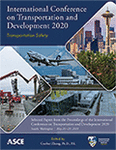International Conference on Transportation and Development 2020
A Method for Urban Road Waterlogging Recognition Based on Fundamental Diagram
Publication: International Conference on Transportation and Development 2020
ABSTRACT
In many developing cities with impropriate urban planning strategy and poor drainage system always suffer waterlogging problem during heavy rains. Waterlogging, as a well-known urgent problem for urban development, will increase risk of traffic accidents, cause malfunction of transportation system, and seriously threaten people lives. However, those harm can be effectively reduced by giving an early warning to citizens after detecting the water accumulation. Some existing methods based on detective sensor are proved to be expensive and low precision. Other methods try to apply macro simulation model to predict result of waterlogging, but complicated mathematical modeling, as well as getting access to geographic information and related data sources, is hard to implement. Therefore, this paper proposes an effective data-based approach for waterlogging recognition built on fundamental diagram (FD) of traffic flow. The methodology implements a real-time intelligent recognition on waterlogging points by observing shift on FD and calculating the probability of waterlogging. Compared to existing methods, it has the better applicability on entire urban road network, the easier realizability on application implementation, and more independent on data requirement. A study case of Shenzhen (a city in southern China) waterlogging indicates the methodology can effectively provide a real-time recognition on road segments prone to water accumulation during rainstorm, and the accuracy is proved to be better than any other similar approaches.
Get full access to this article
View all available purchase options and get full access to this chapter.
REFERENCES
He Q. (2009). System and Method of Monitoring and early Warning for Bridge or Tunnel Road..
Chen X A et al. (2012). Alarm Device for Culvert Waterlogging Level Detection..
Wu S. (2015). An Intelligent Monitoring System for Urban Road Waterlogging Accumulation..
Ma C G. (2016). A Monitoring Device for Waterlogging Accumulation in Overpass Tunnel..
You F C et al. (2013). Statistical Analysis and Application of Heavy Rainfall and Road Waterlogging in Beijing. meteorological. 2013.39(8) : 1050–1056.
Zhen S S et al. (2014). Short-term Prediction of Urban Road Waterlogging under Rainstorm based on STARMA Model. Progress in Geography, 2014, 33(7): 949-957.
Su B N et al. (2016). Integrated Simulation Method for Waterlogging and Traffic Congestion under Urban Rainstorms. Nature Hazards (2016) 81:23–40.
Xu J et al. (2009). Analysis of Vehicle Accidents Caused by Water Accumulation on Straight Lines. Journal of China Highway. 22(1):97-103.
Du L. (2011). Research on Impact and Loss of Traffic Caused by Different Level of Road Waterlogging. National Urban Road Traffic Conference.
Liu J. (2014). FCD-based Regularity Studies for Urban Expressway Congestion Triggered by Flooding under Bridge. Beijing Jiaotong University.
Liu et al. (2013). Research on the Method for Identifying Urban Traffic Congestion Points caused by Waterlogging Under Bridge Based on FCD. Traffic Information and Safety. 31 (176): 43-48.
Greenshields B D. (1935). A Study in High way Capacity. Highway Research Board Proceedings, 14: 448-477.
Underwood R T. (1961). Speed, Volume and Density Relationship: Quality and Theory of Traffic Flow. New Haven, Connecticut: Yale Bureau of Highway Traffic, 141-188.
Newell G F. (1961). Nonlinear Effects in the Dynamics of Car Following. Operations Research, 9 (2):209-229.
Castillo J M D. (1995). On the Functional form of the Speed. density Relationship I: General Theory. Transportation Research Part B, 29 (5): 373-389.
Wang H Z et al. (2011). Logistic Modeling of the Equilibrium Speed density Relationship. Transportation Research Part A: Policy and Practice, 45(6):554-566.
Information & Authors
Information
Published In
International Conference on Transportation and Development 2020
Pages: 231 - 242
Editor: Guohui Zhang, Ph.D., University of Hawaii
ISBN (Online): 978-0-7844-8314-5
Copyright
© 2020 American Society of Civil Engineers.
History
Published online: Aug 31, 2020
Published in print: Aug 31, 2020
Authors
Metrics & Citations
Metrics
Citations
Download citation
If you have the appropriate software installed, you can download article citation data to the citation manager of your choice. Simply select your manager software from the list below and click Download.
